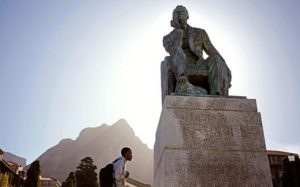Students have tossed excrement on a campus statue of the British colonialist Cecil John Rhodes at the University of Cape Town in South Africa, calling the monument a tribute to the white domination of the past. Demonstrators have demanded removal of the statue and organized a “Rhodes must fall” campaign on social media.
Memories of racial conflict are still fresh in South Africa, which shed white racist rule in 1994 after all-race elections. Rhodes, who died in 1902, was the namesake of Rhodesia, which became Zimbabwe after independence in 1980. He bequeathed land on which the University of Cape Town was built.
Student leader Ramabina Mahapa criticized the university as “Eurocentric” on Monday during a campus meeting chaired by Crain Soudien, a deputy vice-chancellor of the university.
“We, as black students, as African students, need to be able to identify with the institution,” Mahapa said. “Whose heritage are we preserving?”
Mahapa then led a walkout of students from the meeting.
The university has said it recognizes “divergent views” over the statue and that it is important to debate the matter. The dumping of excrement on the statue was “reprehensible and regrettable” and an investigation was under way, the university said in a statement last week.
“Rhodes’s imperialist and racist attitude to Africa causes much controversy and resentment today,” said the university, but the educational institution “probably would not have come into existence in 1918” without his land donation.
The statue, unveiled in 1934, depicts Rhodes in a seated position. After the excrement incident protesters wrapped it in black garbage bags, which were later removed.
Trudi Makhaya, who studied as a Rhodes scholar at Oxford University, wrote in South Africa’s Business Day newspaper that Rhodes’s will was limited by the sexism and racism of his era but its scholarship endowments revealed a man who recognized some universal virtues.
Makhaya wrote: “These contradictions, Rhodes the pillager and Rhodes the benefactor, are a symbol of our country’s evolution towards a yet to be attained just and inclusive order.”
Source: The Guardian



